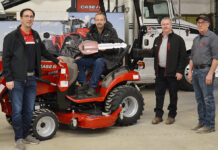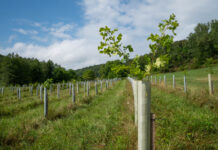SALEM, Ohio — Every person has a story to tell. Some will tell you they don’t, but there is always a story.
At the Forever Safe Farm, the same is true about the animals that have been rescued over the years.
The beginning
On McCracken Road in Salem, the Campf family began Forever Safe Farm after they both began rescuing dogs and rehabilitating them.
Rob started his rescue life by rescuing pitbulls and his wife, Karrin, was also involved in rescuing animals from an early age.
The two met and realized they had a mutual love for animals. They started rescuing dogs together and their efforts now includes camels, coatimundi, wallabies, pot belly pigs and a zebra.
Zebra rescue
Zimbabwe, or Zimmy for short, is a zebra that was a rescue from a zebra breeding farm. They were breeding for females and instead Zimmy, the boy, was born. The farm couldn’t keep him because their stud would attack him. Lucky for him, the farm didn’t want to sell him through the exotic trade and instead asked Forever Safe Farm to take him.
As Karrin talks about the animals and the tribulations they have faced, she smiles as they come to her and show her affection.
Next to the miniature horses and pony is a pen for the five camels that reside on the farm. Arthur, Mongo, Sydney, Eli-fuzzybutt and Abu chomp on their pelleted feed and grass hay as Karrin chats with me. There are two dromedaries, one bactrian and two hybrids (a cross between the two).
Camels
Karrin said they were worried at first that camels could be a challenge to take care of. But they read up, sought veterinary advice, and now take care of the five of them.
She said one of the camels was brought in as a baby. He had been bought by an exotic dealer and another person bought him from them. Soon after, the person realized he didn’t have the ability to feed him. The camel wouldn’t eat when he arrived and cried out for his mother. After constant attention, the camel finally learned to eat the diet, and he now lives in the herd.
Another animal on the farm is Rudy, the whitetail deer. Rudy was born on a deer and elk farm that raised them for hunting. An elk stepped on his leg as a baby and it had to be amputated. The farm called the sanctuary and Rudy found a home.
Coatimundi
And then there is the coatimundi, in an enclosure in back of the Campf’s home.
The brother and sister (they are spayed and neutered) were surrendered by a lady in Arkansas. She had attempted to declaw them herself and infection set in. She couldn’t find a veterinarian to help her. She called the Forever Safe Farm and they were flown into the Cleveland Airport and taken to the Akron Zoo.
They were given antibiotics and bone marrow transplants because the infection was so bad. Today, they live in the enclosure, have human contact and enjoy eating scrambled eggs and fig cookies.
They also have one other trait that is a little bit different, they enjoy smelling perfume.
Each animal, whether it is a goat, zebra or camel, has a story to tell about how it arrived at the farm.
Learn from others mistakes. Now the family concentrates on feeding the animals and providing a home for each one. Karrin also hopes that by having the public tour the facility they will learn how the exotic animal trade hurts animals.
“So many are bought as babies when they think they are cute and then when they take them home, they realize they don’t have the appropriate housing or ability to take care of them once they get a little older,” said Karrin.
The Forever Safe Farm Animal Education Inc. is a 501 (c) (3) nonprofit corporation operated exclusively for charitable purposes. The facility also has full-time caretakers who concentrate on the animals well-being. There is a gift shop being created in the main facility for others to purchase caps or mugs, and the money will be used to fund the food and housing of the animals.
Future plans
The farm is not done expanding or helping animals. Karrin explained that they want to build a chimpanzee sanctuary on the farm.
“My real love is chimps,” said Karrin.
There are 10 accredited sanctuaries in the United States and the Campfs are hoping to be the next one. They have began fundraising, but a lot more is needed.
Karrin explained that $1.3 million is needed to build what is essentially a maximum security prison with the most enhancement you can provide for chimpanzees, including a trapeze for them to entertain themselves.
Chimp research
Karrin has been working with a veterinarian from a Chicago zoo who studies primates, and has the plans almost completed for the building. She is using his knowledge to ensure it is safe for the chimps and humans.
She explained chimps that live in laboratories reside in 5-by-5-by-7 foot cement cells. There is legislation in Congress that will require labs to release the chimps and new facilities will be needed to house them.
Karrin said she likes chimps because they have 98.6 percent of the human DNA and can feel emotions like anger, joy and even suffering.
“We are the only country on the planet still testing on them. Do you believe that? It’s because the others have figured out how smart they are and how human like they can be,” she said.
She said the goal of Forever Safe Farm is not to be a roadside zoo, but an educational center.
Karrin said she hopes the work her family does, including her three daughters, helps prevent unwanted animals by teaching people about spaying and neutering.
“It’s about the commitment. You have got to commit to be passionate about an animal’s needs,” she added.











While there are owners who get in over their head because they didn’t research before buying, there are many very responsible exotic animal owners who meet and exceed the needs of their animals. There are species organizations that are a wealth of information about the care of exotic animals and these orgs work to educate the public and potential buyers about the committment and responsibility needed to care for any animal. You can’t lump all owners into the “bad” category. There are more responsible owners than there are irresponsible ones.
Nancy,
Thank you for the kind comments. We invite all to visit and you are right, especially after the Zanesville tradgedy, we can’t all be lumped together. Please visit.
Thanks, Rob Campf
Quite a tale; one I don’t put much stock in after reading other readily available info. I found reference to *buying* their first camel at auction, while derogatory remarks were made about auctions and the pet trade. Another place I found reference to “There are so many ‘backyard chimps’ in garages and basements across America, a lot of starving situations.” Really? I don’t believe a word of it when you consider $35,000 is the low end price, most being much higher. People buy these willy-nilly across America and take them home to stave them? Please, get realistic. I could claim farmers pay as much for champion bulls, take them home and eat them!
Sadly, many in the exotic business – yes, it IS a business – have learned it is much more lucrative to follow the “sanctuary” path to get others to pay for the care of animals they love, sometimes purchase, enjoy and share with others (exploitation?) and often times bought at auction…just as they have done. Perhaps animals at auctions do get good homes?
Hello Amy,
What have you done in your life to help animals. Yes, I am proud to say I did purchase Arthur, a healthy baby dromedary camel to learn so I could help sick, abandoned camels. If you have a problem with that, then it is your problem. You are welcome to visit and learn (I don’t want your money) , maybe you can open your mind and see all is not evil. But then again, what have you done?
Frankly, what you do is awesome, in my opinion – even the purchase or sale of an animal. My “problem” is the hypocrisy in what you are free to do, while claiming the exotic trade hurts animals. If it were not for the exotic trade, YOU would not be able to enjoy the animals nor educate others. The message appears to be hypocritical, not unlike most “sanctuaries” across the US.
If animals are constantly portrayed in this manner, you’re only perpetuating an animal rights agenda and contributing to the loss of all rights to own, buy and sell any animal.
Educating new or potential owners? YES. Adding to the “we can do it right but no one else can mantra of animal rights backed “sanctuary?” NO.
You are right. Maybe it does come across hypocritical, we thought that ourselves when Acres magazine interviewed us. We knew we did not want to participate in what 90% of people who purchase an exotic animal don’t see it through it’s whole life when that animal has actually bonded to it’s caretakers (if kindly cared for) . The animal then becomes a burden or expense and is fed cheap feed or anything leftover to survive. We all are guilty of seeing that cute baby of any species and forgetting the responsibility of taking care of it for years to come sometimes with great expense whether it is medical care or just normal husbandry.. That said, this is the reason we are letting the public visit (for free) to maybe tell some people of the mistakes we made along with the good we have done and enjoying taking care of animals that have arrived here as a last chance, so sick some don’t make it. (Zebby, a full grown zebra with underdeveloped kidneys because his owners who purchased him at an exotic auction fed him cows milk as a colt in an effort to keep him friendly by bottle feeding, good intentions cost him his life) We have taken in horses from the Mahoning Sheriffs Department that myself and another man carried to our trailer. (note full grown and starved to skeleton). We don’t want to come across as ” we can do it, you can’t”, we want to provide an opportunity for people to see what it takes to make a lifelong commitment to these animals. We have had school groups for years for free visit at an incredible cost of insurance on our part. We need the communities help if we are to afford the next step, chimpanzees. Please visit ” the center for greats” online in Florida. They are phenomenol
Another thought after seeing Karrin’s Facebook page – Wayne Pacelle and HSUS are supported. I hope you educate yourselves about the whole picture instead of a small box of “I love chimps.”
Actually we have Steve Ross from the Lincoln Park Zoo in Chicago as our direct advisor and Linda Brendt ( Chimp Haven) as our advisors along with Leslie Day and Sarah Baeckler ( Chimps Inc and Chimp Sanctuary NW). We’ve done our homework and will be trained in Shreveport, LA for this huge task. We have pursued this for years and I’m sure it will still be years before it happens. We have much to learn about chimps and a lot of money to raise. My company pays for three paid helpers and we are lucky to have dozens of great volunteers to help. It is huge expense but we will hopefully touch some kids hearts to maybe think twice about animal cruelty. I’m no pushover and hopefully they might stand up some day to their friends who are about do some crazy thing to an animal and say “I’m gonna be the one to stop that”. In a nutshell, that’s our goal, we’re not perfect.
Rob,
I agree with Amy that you need to educate yourselves about the HSUS. There is a very good place to do that, HumaneWatch.org, which will open your eyes to the truth which is backed up with documentation. The HSUS is not your friend. They are working day and night to end all human /animal interaction. Private owners,sanctuaries,educational facilities, and zoos are all a target. If you support them you are supporting their agenda against you.
Good to see your comments, nice. “We’re not perfect” sums it up quite well, none of us are perfect. Not as parents, farmers, dog owners or any other. Nancy, above, got her first primate at an auction if I remember correctly. No pre-planning or other, just got a macaque named Tess. Is she a good owner? YES, I believe she is. Me, got my first primate from a breeder, paid a deposit and got the monkey much later. The internet wasn’t a wealth of information yet or any other owners close by – 17 years ago. While we may be worlds apart from beginning to end on ownership ( Nancy and I ) I would think you could see the impact on future owners and how animal keeping progresses if rigid or judgmental views are used.
Cruelty, neglect and abuse will ALWAYS happen; we can’t even stop it with our own young. I don’t believe the 90% rate you claim without a reference and know there are many good owners. Sometimes you only see what you look for perhaps? Ohio has cruelty, abuse and neglect laws already covered in the ORC. What future keeper do you consider to exclude based on arbitrary guidelines? What was your experience going in? Not calling you out, just rhetorical.
Hi Amy,
I don’t think we are so far apart on ownership at all. We both believe in responsible ownership and we both are good examples of that. We both hate the “I can do it , but you can’t” idea that so many sanctuaries tout to make themselves look better than “private” owners but not realizing they are private owners themselves. I do believe that the auctions are part of the problem when it comes to irresponsible ownership and I am not sure you agree with me on that. I never should have been allowed to walk into an auction and buy my first primate without any knowledge of the responsibilities that go with it. Luckily, I am a responsible animal owner by nature and knew that I had to figure out how to care for Tess ASAP and I found people who could guide me and everything worked out. But that is not always the case with some people that buy from auctions and the animals end up in the sanctuaries that say “I can do it but you can’t”. In their eyes that is true since irresponsible ownership is all they see. I think we are both working very hard to try to change that.
I see it as a plus that you did get Tess, even at an auction. Everyone starts somewhere, even Rob got his first camel at auction. How many future owners won’t exist because of having to jump through flaming hoops? Would you have gotten Tess? Would Rob have gotten Arthur? I don’t think “we” are special in any way and are denying future generations the same opportunities we’ve had, and loved.
The future looks rather bleak for any potential owner and we all know how that turns out. How many people spend time and money helping dogs if they’ve never owned one? Nah, it’s dog owners, the ones having hands-on experience.
I have spent a lifetime helping animals (since age 12 with the help of my parents till I turned 16 and got job). 37 years later, still doing it. Not gonna be good enough for a person with your vast expertise. No sense wasting more time on you. Sorry your young ones neglect animals, mine don’t. Good day.
Rob, wow. Not sure how you got “sorry your young ones neglect animals” out of that. I was referring to the fact that we have child abuse going on every day. NO, NOT BY ME, THANKS. and we will always have those with no regard for another – and we have laws to address those instances.
I stand by my auction stance. Just look above – 3 out of 3 owners have attended and purchased through an animal auction. What does that tell you? I don’t understand denying others the right to start, just as you have.
“No sense wasting more time on you” is a slap in the face, just as you intended. No harm, no foul – happened before, and honestly – just know I hit a nerve. I’ve always helped individual animals when and where I can. I don’t care how many years you have and only mentioned 17 years as rebuttal to your claimed 90% you have yet to support with fact. And THAT is only because it is one of the animals on the chopping block of our legislators. Four of eight – HALF of them – are here because of bans in their area, not abuse, neglect or cruelty. I pay for their needs without a 501(c)3 and don’t disrespect others’ right to own. I would also like to know where all the “chimps in basements across the US” are, as stated by your wife? Sincerely hope you do some research outside YOUR box and some heavy soul-searching when it comes to your judgments.